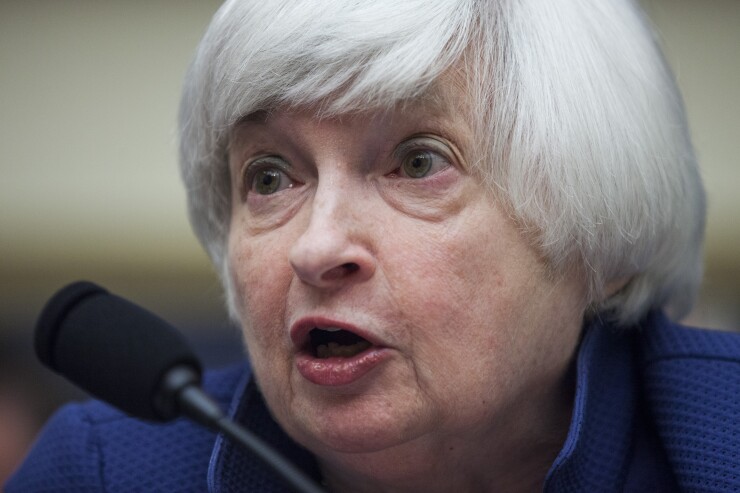
WASHINGTON — House Democrats raised concerns with Treasury Secretary Janet Yellen Tuesday about whether invoking the systemic risk exception in Silicon Valley Bank and Signature Bank's failures was the right call.
Rep. Bill Foster, D-Ill., expressed some concern that regulators ultimately resorted to
"When resolving failed banks, there can sometimes be a tension between lowest-cost resolution and the bipartisan desire to discourage further bank consolidation into a smaller number of very large banks," he noted.
First Republic Bank was seized by regulators and sold to JPMorgan Chase on May 1, a move designated as the least-cost option by the FDIC. The acquisition of First Republic Bank by JPMorgan Chase still caused a then-estimated $13 billion hit to the Deposit Insurance Fund, and inflated the balance sheet of what was
As Yellen noted Tuesday, banks holding more than 10% of total uninsured deposits — like JPMorgan — are generally not permitted to acquire other banks under the Riegle-Neal Act of 1994. However, this prohibition has an exception, allowing firms above the 10% limit to acquire banks which are failing if necessary to prevent crises and maintain banking stability.
Rep. Stephen Lynch, D-Mass., asked whether the biggest banks were ultimately the best suited to absorb another bank that is failing or in receivership. Yellen noted that, ultimately, the winning bidder provided the least-costly deal regardless of how large they may be.
"When the FDIC resolves a bank, it is required by law to take the best offer it gets," Yellen said. "In this case, it was JPMorgan Chase."
Rep. Josh Gottheimer, D-N.J., questioned whether bigger banks may have had an advantage over smaller firms in the bidding process for First Republic.
"In First Republic's receivership, I'm concerned that the largest banks were given preference in the bidding process, just enabling the biggest banks to grow even bigger," he said. "My understanding is that the FDIC kept certain regional banks from even bidding on First Republic."
Democrats also inquired about why Silicon Valley Bank and Signature Bank were granted systemic risk exceptions while First Republic was not. Rep. Lynch said regulators' willingness to invoke a systemic risk exception this year could undermine the original statutory intent of least-cost resolution if the exception becomes the rule in practice.
"The problem that I see is that the least-cost resolution preference was meant to lower the costs of resolution and it's hard for me to imagine a similar situation ever arising where a systemic risk exception would not apply," he told Yellen. "I'm just wondering if this exception has swallowed the rule."
Yellen pushed back, citing past instances where regulators adhered to least-cost resolutions, including during the 2008 crisis and recently with the failure of First Republic Bank.
"Hundreds of banks failed in the aftermath of the global financial crisis and the FDIC resolved most of them and they used the least-cost method of resolution. This is a very unusual situation where this exception had to be invoked," she insisted. "First Republic was resolved, and it was also done in a least-cost resolution."
The secretary also weighed in on ongoing debates in Congress like
"One hole pertains to the supervision of spot-markets, where digital assets are not regarded as securities — so there needs to be regulatory authority there," Yellen said. "Stablecoins are a type of digital asset that really requires a full-blown federal regulatory framework, and I think this is an area where congressional legislation is appropriate"
Rep. Brad Sherman, D-Calif., refuted the idea that crypto needs any new framework at all, concurring with the view of Securities and Exchange Commission Chair Gary Gensler that most cryptocurrencies are securities.
"Chair [Hill] talked about crypto and said we need a regulatory scheme," he said. "I want to say, we have a regulatory scheme, we have the securities laws and thank God Gensler is enforcing them."






